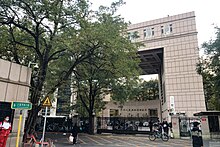|
Ministry of Finance (China)
The Ministry of Finance of the People's Republic of China is the constituent department of the State Council of the People's Republic of China which administers macroeconomic policies and the annual budget. It also handles fiscal policy, economic regulations and government expenditure for the state. The ministry also records and publishes annual macroeconomic data on China's economy. This includes information such as previous economic growth rates in China, central government debt and borrowing and many other indicators regarding the economy of mainland China. The Ministry of Finance's remit is smaller than its counterparts in many other states. Macroeconomic management is primarily handled by the National Development and Reform Commission (NDRC). State-owned industries are the responsibility of the State-owned Assets Supervision and Administration Commission, and there are separate regulators for banking, insurance and securities. It also does not handle regulation of the money markets or interest rates. These, together with other aspects of monetary policy, are governed by the People's Bank of China (PBC), mainland China's central bank. The Ministry, NDRC and PBC are equal in status, with their political heads all sitting on the State Council. HistoryThe Ministry of Finance of the People's Republic of China was formerly known as the Ministry of Finance of the Central People's Government, which was established on October 1,1949.[1] In September 1954, the First Session of the First National People's Congress was held in Beijing, at which the Constitution of the People's Republic of China and the Organic Law of the State Council of the People's Republic of China were adopted. The former Ministry of Finance of the Central People's Government was transformed into the Ministry of Finance of the People's Republic of China, which took over the related work and became a constituent department of the State Council.[2] On 1 July 1967, during the Cultural Revolution, the Central Committee of the Chinese Communist Party, the State Council and the Central Military Commission decided to implement military rule over the ministry; the Director of the Military Control Commission Yin Chengzhen became the head of the ministry.[3] In 1969, the State Council approved the consolidation of PBC's headquarters as a bureau within the Ministry of Finance.[4]: 38 Local PBC branches were merged into local government finance departments.[4]: 38 The Military Control Commission was replaced with a Revolutionary Committee on 22 June 1970. The ministry was reorganized and restored its ministerial system in January 1975.[5] In 1978, the PBC was separated from the Ministry of Finance.[6]: 21 The Ministry held China's first bond auction in 1996.[6]: 35 In 2009, the Ministry converted its ownership of $200 billion of China Investment Corporation's debt into equity, a result which relieved CIC of interest payments on the special treasury bonds that had initially capitalized it and instead resulted in CIC paying an annual dividend to the Ministry.[4]: 110–111 The Ministry has sought to implement property taxes since the early 2010s, but has been opposed on this issue by the National People's Congress and many local governments.[7]: 60–61 As of at least early 2024, property taxes have been kept off the legislative agenda.[7]: 60–61 The Ministry is among the state entities which contribute to the China Integrated Circuit Industry Investment Fund, which was established in an effort to decrease China's reliance on foreign semiconductor companies.[8]: 274 The fund was established in 2014.[8]: 274 In 2015, the Ministry of Finance allocated 2 billion RMB to establish e-commerce centers in some of the least developed areas of rural China.[9]: 128 This approach has since inspired similar strategies in Egypt, India, and Vietnam.[9]: 128 RoleDuring the pre-Reform period of centrally planned public finance, capitalization of industrial and infrastructure projects has handled through public expenditure.[6]: 42–43 The State Planning Commission designated projects and the Ministry allocated revenue to them.[6]: 42–43 The main functions of the Ministry is to carry out the following duties of the state:[10]
The Ministry of Finance in involved the foreign aid process through making China's donations to multilateral financial institutions.[6]: 73 Organizational structureOrganizational structure obtained from the Ministry of Finance website:[10]
LeadershipAll of the leaders are members of the Ministry's Communist Party Committee, with Lan Fo'an as its secretary.[12][13]
As shareholderThe MOF also acted as the controlling shareholder for a number of financial service companies of China, such as People's Insurance Company of China, China Life Insurance Group (parent of China Life), China Taiping Insurance Group (parent of China Taiping Insurance Holdings), etc. The Ministry also owned Industrial and Commercial Bank of China, the Agricultural Bank of China, the Bank of Communications, China Great Wall Asset Management, China Cinda Asset Management, China Orient Asset Management, China Huarong Asset Management and China Re, etc. MOF also owned China Railway, China Tobacco and CITIC Group. See also
References
External links
|
||||||||||||||||||||||||||||||||||||||||||||||||||||||||||||||||||||||||||||||||||||||||||||||||||
